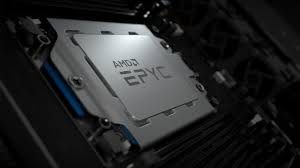Advanced Clustering Technologies Now Offering AMD EPYC™ 7002 Series Processor-based Systems
Posted on August 8, 2019 Kansas City, Mo. (Aug. 7, 2019) – Advanced Clustering Technologies, a provider of custom, turn-key high performance computing hardware solutions, announced today that it is offering AMD EPYC™ 7002 Series based systems.
Kansas City, Mo. (Aug. 7, 2019) – Advanced Clustering Technologies, a provider of custom, turn-key high performance computing hardware solutions, announced today that it is offering AMD EPYC™ 7002 Series based systems.
“Our new series of ACTserv systems will deliver 128 PCI-e lanes and up to 64 cores per socket. These are perfect for your high-memory or I/O intensive workloads.” said Kyle Sheumaker, President of Advanced Clustering. “We look forward to providing EPYC as an option for our HPC customers.”
The new 2nd Gen AMD EPYC™ Processors power the most demanding workloads with breakthrough CPU performance, giving customers a new level of integration and performance for their modern datacenters.
“Driven by AMD’s history of datacenter innovation, including 7nm process technology, the first x86 supplier to support PCIe Gen 4, and embedded security protection, the 2nd Gen AMD EPYC Processors set a new standard for the modern datacenter,” said Scott Aylor, corporate vice president and general manager, Datacenter Solutions Group, AMD. “Together, these innovations deliver the breakthrough performance customers need.”
Delivering a comprehensive, consistent feature set of I/O, memory and security features, across 8 to 64 “Zen 2” cores, the 2nd Gen AMD EPYC™ Processors deliver agility from a balanced set of features. The new processors also make the datacenter more responsive to today’s workload demands and are focused to address those coming in the future.
Advanced Clustering’s HPC systems have proven highly effective for higher education computing resources and in a range of commercial sectors including financial services, climate and weather research, manufacturing and automotive design.
Visit advancedclustering.com to learn more about the company’s AMD EPYC 7002 Series Processor-based systems.
[1]Testing performed by AMD Engineering as of October 2018 using AMD reference system with a preproduction “Rome” engineering sample, where “Rome” scored approximately 2x higher compared to “Naples” System. Actual results with production silicon may vary. ROM-03
[1]Estimated generational increase based upon AMD internal design specifications for “Zen 2” compared to “Zen”. “Zen 2” has 2X the core density of “Zen”, and when multiplied by 2X peak FLOPs per core, at the same frequency, results in 4X the FLOPs in throughput. Actual results with production silicon may vary. ROM-04
Categories
- ACTnowHPC (8)
- AMD (5)
- Big Data (1)
- Case Studies (6)
- Cloud HPC Computing (16)
- Cluster Management (2)
- Clusters (12)
- ClusterVisor (5)
- Company News (46)
- Customer Service (3)
- eQUEUE (4)
- GPU Computing (11)
- Grant Writing (25)
- HPC Clusters (46)
- HPC Compute Blocks (3)
- HPC in the news (67)
- HPC Resources (61)
- Infiniband (3)
- Intel Xeon (19)
- Knights Landing (2)
- NVIDIA GPUs (2)
- NVIDIA Tesla GPUs (1)
- Omni-Path (2)
- Servers (6)
- Storage (5)
- Tech Tips (5)
- Trade Shows (39)
- Uncategorized (64)
- Workstations (3)
Recent Posts
archives
- June 2025
- May 2025
- April 2025
- March 2025
- February 2025
- January 2025
- December 2024
- November 2024
- October 2024
- September 2024
- July 2024
- June 2024
- May 2024
- February 2024
- January 2024
- December 2023
- October 2023
- August 2023
- July 2023
- June 2023
- May 2023
- April 2023
- March 2023
- February 2023
- January 2023
- December 2022
- November 2022
- October 2022
- September 2022
- August 2022
- June 2022
- May 2022
- April 2022
- March 2022
- February 2022
- January 2022
- December 2021
- November 2021
- October 2021
- September 2021
- August 2021
- July 2021
- June 2021
- May 2021
- April 2021
- March 2021
- February 2021
- January 2021
- December 2020
- November 2020
- October 2020
- September 2020
- August 2020
- July 2020
- June 2020
- May 2020
- April 2020
- March 2020
- February 2020
- January 2020
- December 2019
- November 2019
- October 2019
- September 2019
- August 2019
- July 2019
- June 2019
- May 2019
- April 2019
- March 2019
- February 2019
- January 2019
- November 2018
- October 2018
- September 2018
- August 2018
- July 2018
- June 2018
- May 2018
- April 2018
- March 2018
- February 2018
- January 2018
- December 2017
- November 2017
- October 2017
- September 2017
- August 2017
- July 2017
- June 2017
- May 2017
- April 2017
- March 2017
- February 2017
- January 2017
- December 2016
- November 2016
- October 2016
- September 2016
- August 2016
- July 2016
- June 2016
- May 2016
- April 2016
- March 2016
- February 2016
- January 2016
- December 2015
- November 2015
- October 2015
- September 2015
- August 2015
- July 2015
- June 2015
- May 2015
- April 2015
- March 2015
- February 2015
- December 2014
- November 2014
- October 2014
- June 2014
- May 2014
- April 2014
- March 2014
- February 2014
- January 2014
Request a Consultation from our team of HPC and AI Experts
Would you like to speak to one of our HPC or AI experts? We are here to help you. Submit your details, and we'll be in touch shortly.
"*" indicates required fields
